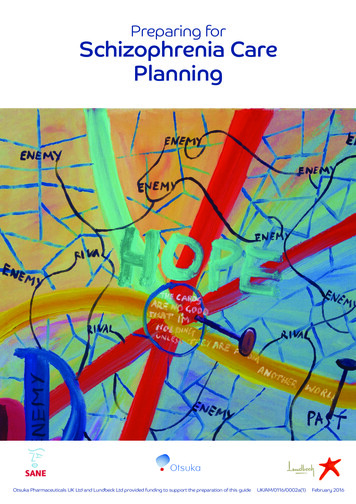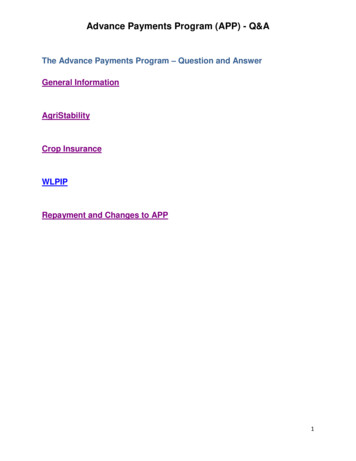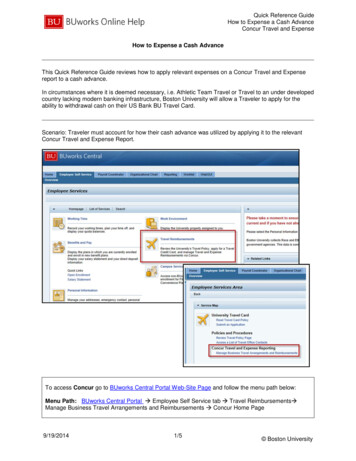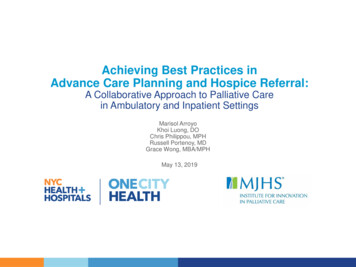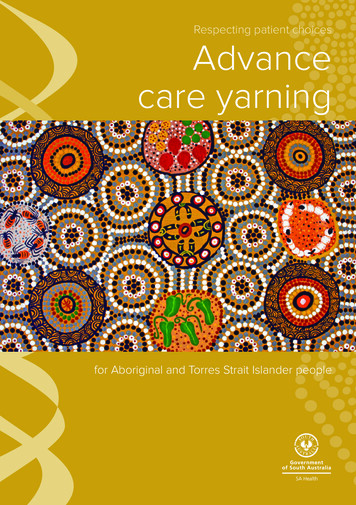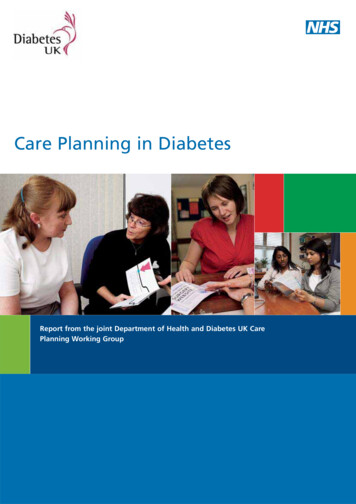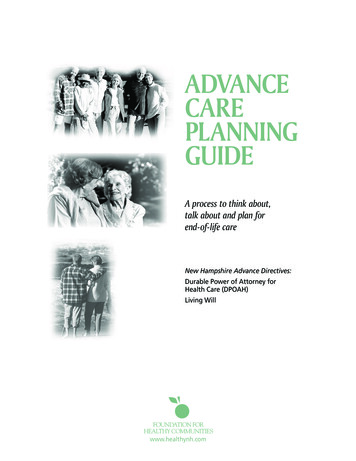
Transcription
ADVANCECAREPLANNINGGUIDEA process to think about,talk about and plan forend-of-life careNew Hampshire Advance Directives:Durable Power of Attorney forHealth Care (DPOAH)Living Willwww.healthynh.com
Why Advance Care Planning?Making decisions about medical care is not always easy – especiallynow that machines can keep patients alive even when there is nohope for recovery. It's your right to participate and plan for yourcare. But at some point, you may become unable to make your own healthcare decisions. That's why it's important to think and talk about your feelingsand beliefs with your loved ones – long before critical decisions must bemade.This guide provides you with information about creating two ”advancedirectives” – legal documents that state your preferences about medicalcare. Please read it carefully and discuss it with your family, doctor, patientrepresentative, chaplain or other caregiver.You don’t need to have an advance directive if you don’t want one – nohospital, nursing home, doctor, nurse or insurance company can require youto have advance directives to provide you with services. However, it’s a goodidea to have advance directives in place if you want to make sure that yourfamily and health care providers follow your wishes about your medical care.It will also make it much easier for your family should you become unable toparticipate in decisions about your care. They will not have to agonize overdifficult decisions, uncertain of what you would want them to do. And, iffamily members or your health care providers disagree about what is rightfor you, advance directives will help you avoid having decisions made by thecourts, which can be difficult, time consuming and costly.Health care provider – A doctor, nurse practitioner or physician’s assistant whoprovides clinical care.NOTE: The first use of terms you may not understand have been indicated in italics and defined in the“Definitions” section at the end of this booklet.Please note that these forms are not the same as NH statutes. You can get the statutory forms from NHRevised Statutes Annotated 137-J, 137-H. The enclosed forms are substantially similar to NH statutes butwritten in simpler language. This guide was prepared based on New Hampshire law as it existed in March2001 and printed to inform, not to advise. This is not intended to be a substitute for legal, medical,or other professional advice. Consult a trained expert for interpretation and application of currentNew Hampshire law. You may republish or cite any portion of this work, with the followingattribution: “Reprinted by permission from the Foundation for Healthy Communities copyright 2001.All rights reserved.” These materials may not be reproduced for resale.
Your thoughts and answers to these questions can help provide you and yourcaregivers peace of mind.VALUES What gives your life its purpose and meaning? What do you value most about your physical or mental well being? For example, do youlove the outdoors? To read or listen to music? To be aware of who is with you? Your abilityto see, hear, taste or touch?FAMILY/FRIEND RELATIONSHIPS Who among your family and friends are important in your life? Have you talked about your choices with your loved ones and with those who will be aroundyou when problems arise or death comes close?SPIRITUAL/RELIGIOUS BELIEFS How would you describe your spiritual or religious life? How does your faith community, church or synagogue support you? Do you have religious beliefs about medical treatment?MEDICAL What health problems do you fear in the future? Under what conditions would you want the goals of medical treatment to change fromtrying to continue your life to focusing on your comfort? Would you want a hospice team or other form of palliative care offered to you? How does cost influence your decisions about medical care? How do you feel about life-sustaining treatment, such as kidney dialysis? Do you want CPRused to revive you? Where do you prefer to receive medical treatment?MAKING PLANS If you could plan it today, what would the last day or week of your life be like? Wherewould you be? Who would be with you? What would you be doing? What general comments would you like to make about dying or death? What will be important to you when you are dying (comfort, no pain, family present, music,prayer, being touched or held, etc.)? Are you interested in organ or tissue donation? Are there people to whom you want to write a letter, or for whom you want to prepare ataped message, perhaps marked to be opened at a future time? What are your wishes for a memorial service: songs or readings you want, or people youhope will participate? Would you prefer to be buried or cremated, or do you have no preference? Have youcontacted a funeral home?PAGE 2
Questions about advance directivesWhat is an advance directive?An advance directive is a legal document, written before you have an incapacitating illness, thatallows you to state your preferences about medical care. The State of New Hampshire recognizestwo forms of advance directives: a Durable Power of Attorney for Health Care and a Living Will.What is a Durable Power of Attorney for Health Care (DPOAH)?A Durable Power of Attorney for Health Care is a document in which you name another personto act as your health care agent to make medical decisions for you if you become incapacitated.You can include instructions about which treatments you do or do not want, or how long you wantto try possible treatments. If you do not want artificial feeding or hydration, New Hampshire lawrequires that you say so in your document.What is a Living Will?A Living Will instructs your doctor to give no life-sustaining treatment if you have a terminalcondition or are permanently unconscious. If you do not want artificial feeding or hydration, NewHampshire law requires that you say so in your document.Do I need both a Durable Power of Attorney for Health Care and a Living Will?It is a good idea to have both documents because they serve two different purposes. A DurablePower of Attorney for Health Care takes effect whenever you become unable to make decisions –for instance, during surgery, or even when you become temporarily unconscious. A Living Will takeseffect only when there is no hope for recovery. Under New Hampshirelaw, if the terms of your advance directives conflict, the Durable Powerof Attorney for Health Care will overrule the Living Will.What is artificial feeding?Artificial feeding means intravenous feeding or feeding through a tube. Itdoes not include the natural process of eating foods. There is little, if any,pain or discomfort in providing artificial feeding.What is artificial hydration?Artificial hydration usually means intravenous fluids. It does not include the natural process ofdrinking fluids. There is little, if any, pain or discomfort in providing artificial hydration.How does the Durable Power of Attorney for Health Care relate to a “do not resuscitate” order?Life-sustaining treatment includes cardiopulmonary resuscitation (CPR); however, you should talkwith your doctor and health care providers about their practices with respect to issuing andimplementing DNR orders.What don’t these advance directives accomplish?These advance directive documents only cover certain important health care issues. They do notprovide for many other important personal planning matters. For example, these advance directivesdo not allow your health care agent to handle your general, financial and decision-making mattersif you become unable to legally handle your own affairs. A “General Durable Power of Attorney”PAGE 3
is recommended to handle this situation, and may avoid the expense and stress of getting aguardianship through the Probate Court. You should discuss this and other related importantnon-health care issues with your attorney.Do I need to renew my advance directives?Advance directives do not need to be renewed. However, if you want to change something ineither your Durable Power of Attorney for Health Care or your Living Will, you must completea new document. You might want to re-examine your health care wishes before each annualphysical exam, at the start of each decade of your life, after any major life or medical changeand after losing your ability to live independently. New Hampshire’s Living Will law was revisedin 1991. If you have an advance directive that was executed before April 2001, your document isvalid, but it will look different from the one in this guide.Can I revoke my advance directive?You can revoke or cancel your advance directive orally or in writing at any time. A divorce actionwill automatically revoke your Durable Power of Attorney for Health Care if your spouse is yourhealth care agent and you have not named an alternate in your document.What if my advance directive was executed in another state?Your out-of-state advance directive is valid in New Hampshire as long as it was legally executed inthe other state. However, it will be interpreted using New Hampshire law.Who should have copies of my advance directives?Copies of your documents should be with your doctor, your hospital, family, and the person youselect as your health care agent or long-term care facility. Ideally the original documents shouldbe stored where you keep your other important legal papers such as wills, birth certificates andsocial security cards. This way you will always have quick access to these important directives.How will my health care providers know I have an advance directive?You should tell your doctor, nurses or other health care providers that you have an advancedirective and provide them with copies for your medical record. Any time you are admitted toa hospital, you will be asked if you have an advance directive. If you know that you will beadmitted to a hospital, you should bring copies of your documents with you.Do I need an attorney?You do not need an attorney to create an advance directive. You can simply use the forms inthis brochure, which are printed substantially similar to New Hampshire laws. However, if youhave questions, you can talk with an attorney or trained staff from your community hospital orhospice. You can get the statutory forms from NH Revised Annotated Statutes 137-J, 137-H.Who can witness the signing of my advance directive?Your advance directive must be signed in the presence of two witnesses and a notary to be valid. Yourhealth care agent named in your Durable Power of Attorney for Health Care, spouse, heir, attendingdoctor or person supervised by your doctor may not serve as a witness. Only one of the two witnessesmay be your health or residential care provider or one of your provider’s employees.PAGE 4
Disclosure: Durable Power of Attorney for Health CareThis is an important legal document. Before signing it, you should know these important facts:Except if you state otherwise, this document gives the person you name as your health care agentthe authority to make any and all health care decisions for you when you are no longer capable ofmaking them yourself. Health care means any treatment, service or procedure to maintain, diagnoseor treat your physical or mental condition. Your health care agent, therefore, will have the powerto make a broad range of health care decisions for you. Your health care agent may consent, refuseto consent or withdraw consent to medical treatment, and may make decisions about withdrawingor withholding life–sustaining treatment. Your health care agent cannot consent to or direct anyof the following: commitment to a state institution sterilization termination of treatment if you are pregnant and if the withdrawal of that treatment isdeemed likely to terminate the pregnancy, unless the treatment will be physically harmful toyou or prolong severe pain which cannot be alleviated by medicationYou may state in this document any treatment you do not want, or treatment you want to be sureyou receive. Your health care agent's authority will begin when your doctor certifies that you are nolonger able to make health care decisions (lack capacity). If for moral or religious reasons you do notwant to be examined by a doctor to certify that you lack capacity, you must say so in the document,and name someone who can certify your lack of capacity. That person cannot be your health careagent or alternate health care agent, or any person ineligible to be your health care agent. You mayattach additional pages if you need more space to complete your statement.If you want to give your health care agent authority to withhold or withdraw artificial nutritionand fluids (artificial feeding and hydration), your document can say so. Otherwise, your health careagent will not be able to direct that. Under no condition will your health care agent be able todirect the withholding of food and drink for you to eat and drink normally.Your health care agent must follow your instructions when making decisions on your behalf. Unlessyou state differently, your health care agent will have the same authority to make decisions aboutyour health care as you would have had, if those decisions are made consistent with state law.It is important that you discuss this document with your doctor or other health care providers beforeyou sign it, to make sure you understand the nature and range of decisions which could be madeon your behalf. If you do not have a doctor, you should talk with someone who is knowledgeableabout these issues and can answer your questions. Check with your community hospital or hospicefor trained staff. You do not need an attorney's assistance to complete this document, but if there isanything in this document you do not understand, you can ask an attorney to explain it to you.The person you choose as a health care agent should be someone you know and trust, and must beat least 18 years old. If you choose your health or residential care provider (such as your doctor, or anemployee of a hospital, nursing home, home health agency or residential care home, other than arelative), that person will have to choose between acting as your health care agent or as your healthor residential care provider; the law does not permit a person to do both at the same time.You should consider choosing an alternate health care agent in case your health care agent isunwilling, unable, unavailable or ineligible to act as your health care agent. Any alternate healthcare agent you choose will have the same authority to make health care decisions for you.PAGE 5
You should tell the person you choose that you want him or her to be your health care agent. Youshould talk about this document with your health care agent and your doctor, and give each onea signed copy. You should write on the document itself the people and institutions who will havesigned copies. Your health care agent will not be liable for health care decisions made in goodfaith on your behalf.Even after you have signed this document, you have the right to make health care decisions foryourself as long as you are able to do so, and treatment cannot be given to you, or stopped for you,over your objection. You have the right to revoke the authority granted to your health care agentby telling him or her, or your health care provider, orally or in writing.This document cannot be changed or modified. If you want to make changes, you must make anentirely new document.This power of attorney will not be valid unless it is signed in the presence of two (2) or morequalified witnesses, who must both be present when you sign and who will acknowledge yoursignature. The following persons may not act as witnesses: The person you have designated as your health care agent Your spouse Your lawful heirs, or beneficiaries named in your will or in a deedOnly one of the two witnesses may be your health or residential care provider or one of yourprovider’s employees.PAGE 6
Selecting Your Durable Power of Attorney for Health Care or Health Care AgentWhen you decide to pick someone to speak for you in a medical crisis, in case you are not able tospeak for yourself, there are several things to think about. This tool will help you decide who thebest person is. Usually it is best to name one person or agent to serve at a time, with at least onealternate, or back-up person, in case the first person is not available when needed.Compare up to 3 people with this tool. The person best suited to be your DPOAH or Health CareAgent rates well on these qualifications Name #1:Name #2:Name #3:1. Meets the legal criteria in your state for acting as agent or representative?(This is a must! See page 5 – Disclosure.)2. Would be willing to speak on your behalf.3. Would be able to act on your wishes and separate his/her own feelings fromyours.4. Lives close by or could travel to be at your side if needed.5. Knows you well and understands what’s important to you.6. Could handle the responsibility.7. Will talk with you now about sensitive issues and will listen to your wishes.8. Will likely be available long into the future.9. Would be able to handle conflicting opinions among family members, friends,and medical personnel.10. Can be a strong advocate in the face of an unresponsive doctor or institution.What to Do After you Pick a Health Care Agent Talk to your agent about the qualifications on this worksheet. Ask permission to name him or her as your agent. Discuss your health care wishes and values and fears. Make sure your agent gets a copy of your advance directive. Tell family members and close friends who you picked.This worksheet adapted by the American Bar Association’s Commission on Legal Problems of the Elderly from R.Pearlman, et. al., Your Life Your Choices – Planning for Future Medical Decisions: How to Prepare a Personalized LivingWill, Veterans Administration Medical Center, Seattle, Washington. Reprinted by permission.PAGE 7
DURABLE POWER OF ATTORNEY FOR HEALTH CARE(usually referred to as DPOAH)I, , hereby appoint(Name)(Name of Health Care Agent)of(Health Care Agent’s address and phone #)as my health care agent to make any and all health care decisions for me, except if I state otherwisein this document, or as prohibited by law. This Durable Power of Attorney for Health Care shall takeeffect in the event I become unable to make my own health care decisions.In the event the person I choose as health care agent is unable, unwilling, unavailable or ineligibleto act as my health care agent, I choose(Name of alternate health care agent)of as alternate health care agent.(Address and phone # of alternate health care agent)Statement of Desires, Special Provisions, and Limitations about Health Care DecisionsSome general statements about the withholding or removal of life-sustaining treatment are usedin this document. Life-sustaining treatment is defined as procedures without which a person woulddie. Some of these are: cardiopulmonary resuscitation, mechanical respiration, kidney dialysis or theuse of other external mechanical and technological devices, drugs to maintain blood pressure, bloodtransfusions and antibiotics.If I wish to indicate my agreement or disagreement with each of the following statements I willcircle my choice and initial the line beside it, and give my health care agent power to act in thesespecific circumstances.1.If I become permanently incompetent to make health care decisions, and if I am also sufferingfrom a terminal illness, I authorize my health care agent to direct that life-sustainingtreatment be discontinued. (Circle your choice and initial beside it.)YES(Initials)2.(Initials)Whether terminally ill or not, if I become permanently unconscious, I authorize my healthcare agent to direct that life-sustaining treatment be discontinued. (Circle your choice andinitial beside it.)YES(Initials)3.NONO(Initials)I realize that situations could arise in which the only way to allow me to die would be todiscontinue artificial nutrition and hydration. In carrying out any instructions I have given inthis document, I authorize my health care agent to direct that my choices indicated below berespected.I wish to have my life continued with artificial feeding or artificial hydration.YES(Initials)NO(Initials)If artificial feeding and hydration have been started, I want them:STOPPED(Initials)CONTINUED(Initials)I understand that if I do not complete item number 3, my health care agent will NOT have thepower to stop artificial feeding and hydration.DURABLE POWER OF ATTORNEY FOR HEALTH CARE – FRONT
I wish to be given medication which is necessary to control my pain without regard to any ofthe above choices.YESNO(Initials)4.(Initials)I understand that in this paragraph I may write specific desires I want or don’t want, may attachextra pages or may leave this question blank.Under what conditions would you want the goals of medical treatment to switch from tryingto continue your life to focusing on your comfort? What will be important to you when youare dying (comfort, no pain, family present, music, pray, be held etc.)? Do you want to indicatea timeframe for trying treatment options?I hereby acknowledge that I have been provided with a disclosure statement explaining the effectof this document. I have read and understand the information in the disclosure statement.The original of this document will be kept at and the following(Address)persons and institutions will have copies:In witness to this, I sign my name this day of , 20 .(Day)(Month)(Year)Signed(Your Name)I declare that the principal appears to be of sound mind and free from duress at the time theDurable Power of Attorney for Health Care is signed, and that the principal has affirmed that he orshe is aware of the nature of the document and is signing it freely and voluntarily.WitnessAddressWitnessAddressTo be completed by notary:State ofCounty ofThe foregoing instrument was acknowledged before me this day of , 20 .(Day)(Month)(Year)Notary Public/Justice of the Peace My commission expires:Make copies of these two pages for your doctor, hospital, health care agent and familyDURABLE POWER OF ATTORNEY FOR HEALTH CARE – BACK
LIVING WILLOn this day of I,being of sound mind, willfully and voluntarily state that my dying should not be artificiallyprolonged because of medical care being given to me, if the following things happen: If I have a disease, injury, or illness that can’t be cured, or If I am permanently unconscious, And if these conditions are stated by two doctors who have examined me themselves, one ofwhom is my attending doctor, And if the doctors have determined that I will die even if I am given life-sustaining treatment,or that I will remain permanently unconscious, And if this life-sustaining but artificial treatment will only make my dying take longer,I direct that these life-sustaining treatments shall not be given, or be stopped, and that I dienaturally, with only the medication, sustenance or medical procedures that are necessary to giveme comfort care.I know that situations could arise in which the only way to allow me to die would be to stopartificial feeding and hydration (fluids). I state that (circle your choice and initial beside it):I wish to have my life continued with artificial feeding or artificial hydration.YES(Initials)NO(Initials)If artificial feeding and hydration have been started, I want them:STOPPEDCONTINUED(Initials)(Initials)If I cannot give directions about using such life-sustaining treatment, it is my intention that thisdeclaration shall be honored by my family and doctors as the final expression of my right to refusemedical or surgical treatment and to accept the consequences of refusing it.I understand the full import of this declaration, and I am emotionally and mentally competent tomake this declaration.Signed(Your Name)LIVING WILL – FRONT
State ofCountyWe, the following witnesses, being duly sworn, each declare to the notary public or justice of thepeace or other official signing below that:1.The declarant signed this document as a free and voluntary act for the purposes expressed,or expressly directed another to sign for him.2.Each witness signed at the request of the declarant, in his or her presence, and in thepresence of the other witness.3.To the best of my knowledge, at the time of the signing the declarant was at least 18 yearsold, and was of sane mind and under no constraint or undue influence.WitnessWitnessThe Affidavit shall be made before a notary public or justice of the peace or other officialauthorized to administer oaths in the place of execution, who shall not also serve as a witness, andwho shall complete and sign a certificate in content and form substantially as follows:To be completed by notary.Sworn to and signed before me by , declarantand , witnesses, on .(Date)SignatureOfficial CapacityMake copies of these two pages for your health care providers, hospital, health care agent and familyLIVING WILL – BACK
DEFINITIONSArtificial nutrition (feeding) – Using IVs or tubesto supply food when you are unable to eat. Afeeding tube is a medical tube through whichfood or water is put into your vein, stomach,nose, mouth or other body opening.Artificial hydration – Using IVs or tubes to supplywater when you are unable to drink.Attending doctor – A doctor who has primaryresponsibility for your treatment and care.CPR or Cardiopulmonary resuscitation –Emergency medical procedure used to try torestart heartbeat and breathing, which caninvolve blowing into the mouth, pushing on thechest and electrical shock.Certification of incapacity – “Lack capacity,”“inca-pacitated.” If you cannot understandeffectively or communicate your decisions, to theextent that you cannot manage your health caredecisions. This is determined by a doctor.Comfort care – Keeping you as comfortable andpeaceful as possible, including pain medication,giving you ice chips and lip ointment, turningyour body to prevent bed sores and bathingyou.DNR or Do Not Resuscitate order – A doctor’sorder in your medical chart that says you donot want to be revived (CPR) if your heart orbreathing stops.Execute – A legal document is executed, orhas the force of law, when it is signed, dated,witnessed and notarized as required.Health care agent – Someone chosen as yourDurable Power of Attorney for Health Careto make health care decisions when you areunable to express your own wishes for care ortreatment.Hospice care – A team approach to provide comprehensive medical, nursing and social services,spiritual care and bereavement support for youand your family. It is designed to give comfortand relief of symptoms near the end of life.Intravenous or IV line – A tube placed in yourvein that is used to give you fluids, blood ormedication.Life–sustaining treatment – Any medicalprocedure or intervention that, in the judgementof the doctor, would only prolong the dyingprocess but not avert death. This includesassistance to breathe (CPR, ventilator ormechanical respiration), artificial maintenance ofblood pressure and heart rate, blood transfusion,kidney dialysis and other similar procedures,but does not include lessening pain throughmedication or with a medical procedure.Organ and tissue donation – Giving your usableorgans for transplantation into others, whichwill save or improve their lives. Organs you candonate: heart, kidneys, pancreas, lungs, liver,intestines. Tissue you can donate: cornea, skin,bone marrow, heart valves, connective tissue. Tobe transplanted, organs must receive blood untilthey are removed from your body. Therefore, itmay be necessary to place you on a breathingmachine temporarily or provide other organsustaining treatment. Doctors evaluate whetheryou have organs or tissue suitable for transplantat or near the time of death. Your body can stillbe shown and buried after your death.Palliative care – Taking care of the whole person –body, mind and spirit. This approach views dyingas natural and personal; its goal is to provide youwith relief of symptoms (see Hospice care).Permanent medical record – The place where adoctor will write a “Do Not Resuscitate” order.The place where a health facility will keep copiesof your advance directives.Permanently unconscious– If you are not awareof your environment and your own existence orthoughts and have no possibility of recoveringyour awareness.Persistent vegetative state – An irreversiblecondition where reasonable medical judgementfinds the complete loss of key brain functions.It results in the end of all thinking andconsciousness, although heartbeat and breathingcontinue. Periods of sleep and wakefulness willstill occur.Terminal condition, terminally ill – An incurablecondition caused by injury or illness thatreasonable medical judgement finds will causedeath at any time, so that life–sustainingtreatment will only postpone death.Trial of treatment – To try treatment(s) for aperiod of time (such as 1 or 2 weeks) until it isdecided that the treatment will not succeed.PAGE 12
The information contained in this booklet was prepared by theNew Hampshire Partnership for End-of-Life Care a group of organizations that helps people to plan for their health care,talk about their choices and have them respected.It has been endorsed by the following organizations:New Hampshire Hospital AssociationNew Hampshire Medical SocietyHome Care Association of New HampshireNew Hampshire Council of ChurchesNew Hampshire Health Care AssociationNew Hampshire Hospice OrganizationAARP New Hampshire
Notice toHealth Care ProviderAdvance Directive CardI have:a Durable Power of Attorneyfor Health Carea Living Will
You can revoke or cancel your advance directive orally or in writing at any time. A divorce action will automatically revoke your Durable Power of Attorney for Health Care if your spouse is your health care agent and you have not named an alternate in your document. What if my advance directive was executed in another state?


